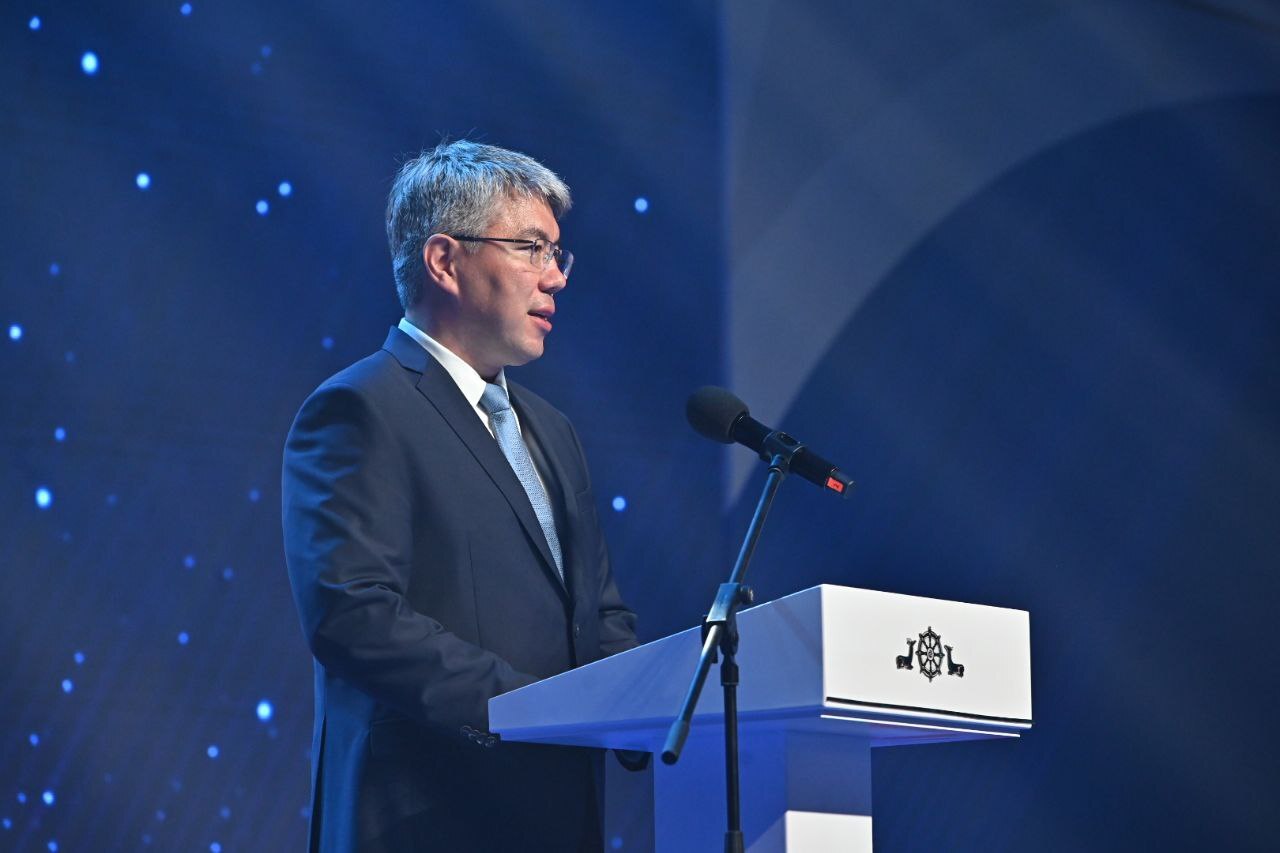The Head of Buryatia, Alexey Tsydenov, extended a warm welcome to the guests of the II International Buddhist Forum during the official opening of the event in Ulan-Ude on Tuesday, August 13.
“Good afternoon, esteemed guests! Distinguished participants of the II International Buddhist Forum!
I warmly welcome all participants of the forum to the shores of the sacred Baikal Lake, in the Republic of Buryatia, Russian Federation!
I am delighted that Buddhists from around the world have gathered for the second time in the capital of Buryatia. The First International Buddhist Forum, supported by 13 countries, provided a valuable platform for international dialogue and comprehensive discussion on the development of Buddhism, Buddhist culture, philosophy, and practice. This forum is unique in that it brings together politicians, public and religious figures, and representatives from academia on a single platform, fostering scientific, educational, and cultural cooperation among Buddhist organizations from various countries.
The 2024 forum is held in a year of significant historical importance. 260 years ago, by decree of Empress Catherine II, the institution of Pandid Lama, the chief Buddhist leader of Russia, was established, marking the official recognition of Buddhism within the Russian Empire.
The establishment of the Pandid Lama Institute was a crucial milestone in the history of Russian society. The Buddhist question has had, and continues to have, substantial significance in Russia’s internal and external politics. The dissemination of Dharma has greatly influenced the national culture and the spiritual and moral state of the Buryat, Kalmyk, and Tuvan peoples. Great Buryat lamas remain exemplary figures of reverence and admiration. They find subsequent rebirths, yet their deeds endure eternally. A prominent example is the 12th Pandid Lama, Dashi Dorzo Itigilov, who has meditated for over 97 years. His state remains unknown to science.
Dear friends, in times of global change, preserving traditional humanistic values is a crucial contemporary task. The protection of these values should foster dialogue and understanding, highlighting the uniqueness and significance of each culture.
Russia is a unique state-civilization where the preservation of traditional values is enshrined in the Presidential Decree. These values include human life, dignity, rights and freedoms, patriotism, civic responsibility, service to the homeland, accountability for its destiny, high moral ideals, strong family, creative labor, priority of the spiritual over the material, humanism, mercy, justice, collectivism, mutual assistance and respect, historical memory, and intergenerational continuity, as well as the unity of the peoples of Russia.
Throughout its long history, Buddhism has facilitated peaceful interaction and mutual enrichment with traditional societies. These qualities are particularly significant in the third millennium, as Buddhism provides a worthy response to contemporary challenges and successfully engages with modern social institutions, science, and philosophy, offering a universal moral foundation for mutual understanding and cooperation.
The teachings of the Buddha guide us in the search for truth, the escape from samsara, and the awareness and perception of things as they truly are.
May the Three Jewels—Buddha, Dharma, and Sangha—be with us! Om mani padme hum!”
“Good afternoon, esteemed guests! Distinguished participants of the II International Buddhist Forum!
I warmly welcome all participants of the forum to the shores of the sacred Baikal Lake, in the Republic of Buryatia, Russian Federation!
I am delighted that Buddhists from around the world have gathered for the second time in the capital of Buryatia. The First International Buddhist Forum, supported by 13 countries, provided a valuable platform for international dialogue and comprehensive discussion on the development of Buddhism, Buddhist culture, philosophy, and practice. This forum is unique in that it brings together politicians, public and religious figures, and representatives from academia on a single platform, fostering scientific, educational, and cultural cooperation among Buddhist organizations from various countries.
The 2024 forum is held in a year of significant historical importance. 260 years ago, by decree of Empress Catherine II, the institution of Pandid Lama, the chief Buddhist leader of Russia, was established, marking the official recognition of Buddhism within the Russian Empire.
The establishment of the Pandid Lama Institute was a crucial milestone in the history of Russian society. The Buddhist question has had, and continues to have, substantial significance in Russia’s internal and external politics. The dissemination of Dharma has greatly influenced the national culture and the spiritual and moral state of the Buryat, Kalmyk, and Tuvan peoples. Great Buryat lamas remain exemplary figures of reverence and admiration. They find subsequent rebirths, yet their deeds endure eternally. A prominent example is the 12th Pandid Lama, Dashi Dorzo Itigilov, who has meditated for over 97 years. His state remains unknown to science.
Dear friends, in times of global change, preserving traditional humanistic values is a crucial contemporary task. The protection of these values should foster dialogue and understanding, highlighting the uniqueness and significance of each culture.
Russia is a unique state-civilization where the preservation of traditional values is enshrined in the Presidential Decree. These values include human life, dignity, rights and freedoms, patriotism, civic responsibility, service to the homeland, accountability for its destiny, high moral ideals, strong family, creative labor, priority of the spiritual over the material, humanism, mercy, justice, collectivism, mutual assistance and respect, historical memory, and intergenerational continuity, as well as the unity of the peoples of Russia.
Throughout its long history, Buddhism has facilitated peaceful interaction and mutual enrichment with traditional societies. These qualities are particularly significant in the third millennium, as Buddhism provides a worthy response to contemporary challenges and successfully engages with modern social institutions, science, and philosophy, offering a universal moral foundation for mutual understanding and cooperation.
The teachings of the Buddha guide us in the search for truth, the escape from samsara, and the awareness and perception of things as they truly are.
May the Three Jewels—Buddha, Dharma, and Sangha—be with us! Om mani padme hum!”







